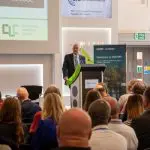UCEM INSPIRE helps leaders build sustainable futures
Posted on: 27 July, 2023
Committed organisational leadership is critically important in driving sustainability across the built and natural environment, according to contributors at UCEM’s second ‘INSPIRE’ event, ‘Leadership for Sustainability in the Built Environment’ which took place in London on Thursday 13th July 2023.
Supported by the Construction Industry Council (CIC), the Construction Leadership Council (CLC) and run in partnership with The Edge, a built environment think-tank, the event included a series of expert speeches, presentations and panel discussions.
During her Opening Address, Hannah Vickers, Chief of Staff at Mace, urged attendees to focus their organisations’ efforts on tangible actions, regardless of whether they were leaders or followers in the sustainability field. Successful leadership requires knowing when to compete and when to cooperate to advance environmental performance.
Keynote speaker, Madeleine Gabriel, who leads innovation charity Nesta’s mission to cut carbon emissions in UK homes, stressed the need to accelerate the pace of change to meet the UK’s carbon-emission reduction targets, which will require more dramatic initiatives in the built environment. Sustainability leaders need to be honest about whether their existing initiatives are big enough in scale to make a difference.
The first panel, chaired by Smith Mordak, CEO of the UK Green Building Council, discussed the need for sustainability leaders to adopt genuinely challenging targets for their organisations. Hero Bennett, Director of Sustainability at Max Fordham, thought that effective change management is the most important factor in realising these targets, with fellow panellist Dr Joe Jack Williams, Partner at FCBS encouraging professional experts to use their specialist knowledge of the environmental impacts of construction to push clients into adopting more stringent sustainability standards. Authenticity and realism about the resources or cultural shifts required are vital in setting targets that are both achievable and capable of mitigating the impacts of climate change, added Andy Nolan, Development & Sustainability Director at the University of Nottingham.
Chris Twinn a member of the Net Zero Carbon Building Standard’s Governance Board then updated attendees on the Net Zero Carbon Building Standard, a ‘rule book’ addressing whole-life carbon with transparency at its heart to make it easily implementable for the whole industry.
The second panel focused on leadership for sustainability, moderated by Amanda Clack, Chair of Trustees at UCEM. Leaders need to empower people in their workforce, according to the consensus reached by the panel. Sustainability must be everyone’s job, not just that of sustainability specialists, argued Ruth Voight, Environmental Sustainability Leader (Europe) for Laing O’Rourke. Guy Grainger, Global Head of Sustainability Services & ESG at JLL, noted that leaders could drive the implementation of greener practices by incorporating sustainability-related goals into staff objectives and climate risk into organisational business models. Educational institutions must mentor future leaders on how to be bold, and professional institutions need to do more via regulation of built environment professionals, said Dr Kayla Friedman, Course Director at the Cambridge Institute of Sustainability Leadership.
During a presentation on biodiversity by Claire Neale, Service Line Director Nature Based Solutions at Atkins, she outlined how new development should be nature positive, as a flourishing natural environment has ancillary benefits for the wider built environment, such as cleaner water and air.
The third and final panel on managing built environment sustainability over the longer term was chaired by Sara Edmonds, Co-Director of the National Retrofit Hub. Jessica Broomhall, Sustainability & ESG at Intermediate Capital Group, highlighted how asset managers can use ‘green loans’ or pools of capital to raise funds for environmentally beneficial projects. Penny Gowler, Head of Sustainability at Elliott Wood Partnership, emphasised the importance of sharing best practices for maintaining sustainability performance. Richard Ellis, Director of Sustainability at Peabody Group, stressed the need for accurate data on building performance and educating stakeholders to identify actions with lasting impact.
UCEM Principal, Ashley Wheaton, commented, “Discussions at this energising event identified that ambition, adaptation, acceleration and cross-sector alignment are all vital aspects of being an effective sustainability leader. I would suggest that another ‘a’ word, authenticity is perhaps most important of all for built environment sustainability leaders. I would urge all in the sector to think courageously and lead with your hearts, not your heads, lead with what is absolutely right. Resist the temptation to go for low-hanging fruit by just doing the small things.”






